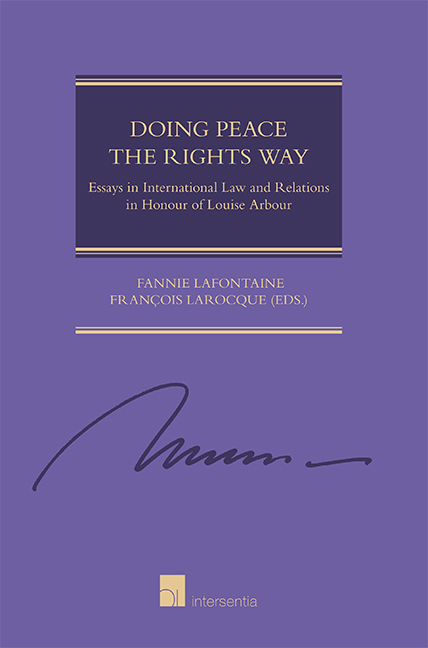Book contents
- Frontmatter
- Foreword
- Contents
- List of Contributors
- Introduction
- PART I OF FREEDOM AND EQUALITY
- PART II OF PEACE AND JUSTICE
- The Deterrence Rationale in a Criminal Justice Accountability Regime
- Peace and Justice: Human Rights Fact-Finding in Raging Conflicts
- “Exceptional Measures” in Times of Crisis: Terrorism, National Security and the Rule of Law
- When the End Lacks the Means: National Prosecutions of International Crimes and Canada's Paper Tiger Approach
- The Independence of International Prosecutors: Where Law Meets Realpolitik
- Torture, Jurisdiction and Immunity: Theories and Practices in Search of One Another
- Revisiting Challenges to International Humanitarian Law
- PART III OF WOMEN AND LEADERSHIP
- An Interview with the Honourable Madam Justice Louise Arbour
The Independence of International Prosecutors: Where Law Meets Realpolitik
from PART II - OF PEACE AND JUSTICE
Published online by Cambridge University Press: 13 April 2019
- Frontmatter
- Foreword
- Contents
- List of Contributors
- Introduction
- PART I OF FREEDOM AND EQUALITY
- PART II OF PEACE AND JUSTICE
- The Deterrence Rationale in a Criminal Justice Accountability Regime
- Peace and Justice: Human Rights Fact-Finding in Raging Conflicts
- “Exceptional Measures” in Times of Crisis: Terrorism, National Security and the Rule of Law
- When the End Lacks the Means: National Prosecutions of International Crimes and Canada's Paper Tiger Approach
- The Independence of International Prosecutors: Where Law Meets Realpolitik
- Torture, Jurisdiction and Immunity: Theories and Practices in Search of One Another
- Revisiting Challenges to International Humanitarian Law
- PART III OF WOMEN AND LEADERSHIP
- An Interview with the Honourable Madam Justice Louise Arbour
Summary
On 24 March 1999, 19 European and North American countries have said with their deeds what some of them were reluctant to say with words. They have voluntarily submitted themselves to the jurisdiction of a pre-existing International Tribunal, whose mandate applies to the theatre of their chosen military operations, whose reach is unqualifi ed by nationality, whose investigations are triggered at the sole discretion of the Prosecutor and who has primacy over national courts.
Louise Arbour, ICTY ProsecutorThis statement from Louise Arbour, pronounced a few weeks aft er NATO countries began a bombing campaign of Serbia claiming a duty of humanitarian intervention, constituted a spectacular affirmation of the independence of the international prosecutor. Not devoid of certain defiance, it was considered unacceptable by the leaders of NATO. The Prosecutor had picked the wrong target. “Don't bite the hand that feeds you” was, in essence, what NATO's spokesman Jamie Shea told her. A few weeks before, when Arbour cautioned Madeleine Albright that the ICTY had jurisdiction over the military actions of NATO in the Federal Republic of Yugoslavia, the former US Secretary of State was also skeptical: “You'd better check with your legal advisors,” Arbour told her. For most political figures at the time, the ICTY and its Prosecutor were still seen as diplomatic tools, a “sword of Damocles” never intended to come down on anyone's head, certainly not theirs!
Both independence and impartiality were personal qualities and attitudes that Louise Arbour had experienced and cherished during her previous careers as university professor, judge – at the Ontario Superior Court and Court of Appeal – and head of a Commission of Inquiry on events that occurred at the Kingston Prison for Women. However, being a fully independent prosecutor was something new, not only for her, but also as an institution. While it is common wisdom that prosecutors should act independently and impartially, domestic prosecutors as an institution generally do not benefit from the same basic legal guarantees of independence that are provided to the judiciary in all legal systems. Furthermore, in many countries, domestic prosecutors are not considered independent; they remain subordinates and have to answer to the executive branch of the government.
Operating in a totally different setting – the international community – which “lacks any central government with the attendant separation of powers and checks and balances,” international tribunals have paved the way to the institution of an “officially declared” independent prosecutor in their respective statutes. In international tribunals established aft er those in Nuremberg and Tokyo, the Office of the Prosecutor is often considered as “a separate organ of the court.”
- Type
- Chapter
- Information
- Doing Peace the Rights WayEssays in International Law and Relations in Honour of Louise Arbour, pp. 253 - 276Publisher: IntersentiaPrint publication year: 2019



